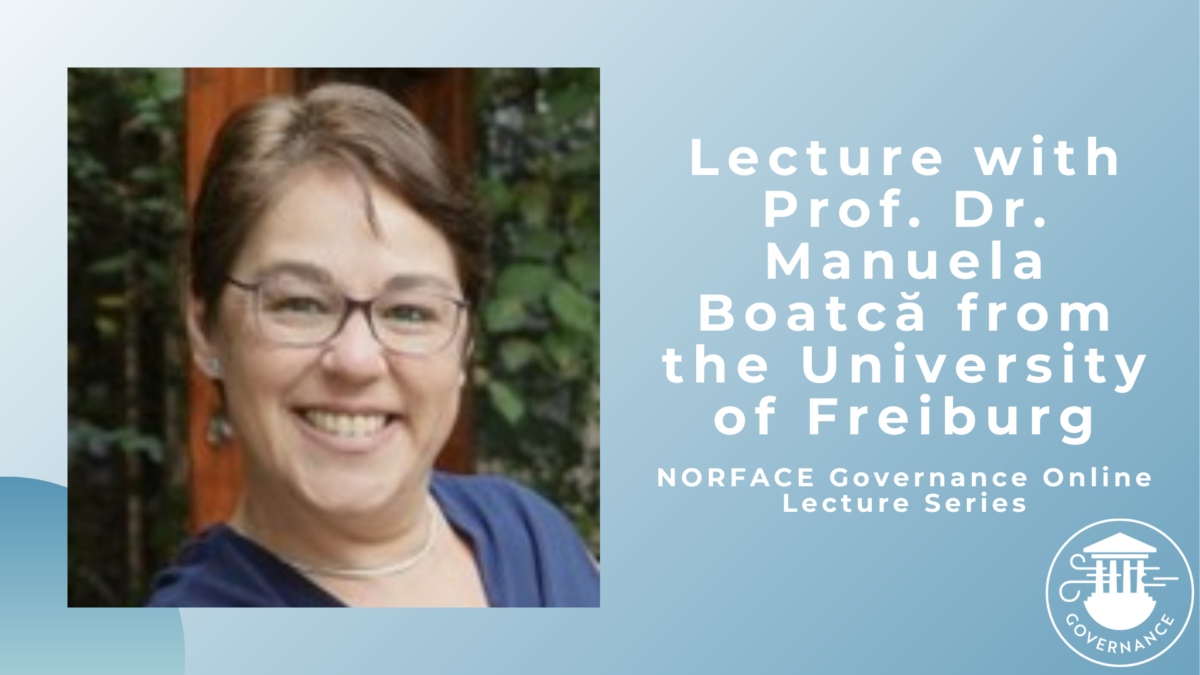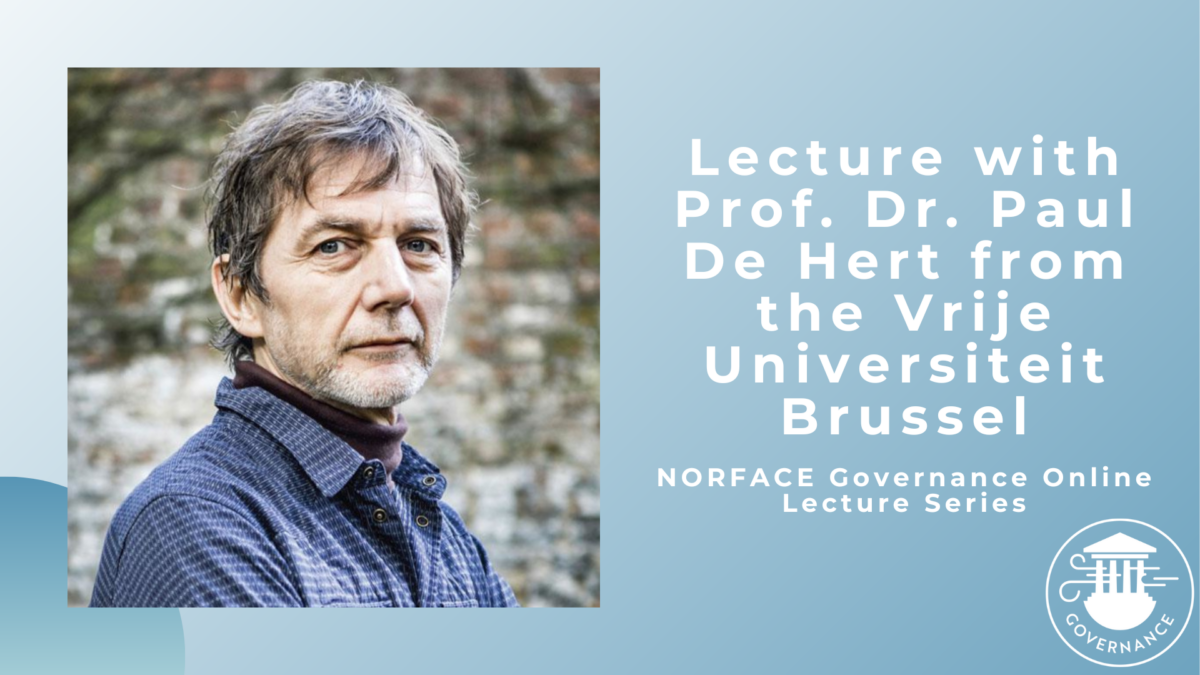NORFACE Governance presenting Online Lecture Series
In this Online Lecture series, academic and professional experts present their findings or views on “Democratic Governance in a Turbulent Age.” These seminars will address at least one of the five core themes of the project. Professional experts include policymakers, democratic representatives, communication professionals, law professionals, and journalists.
First session of Online Lecture Series with Prof. Dr. Rune Slothuus (Aarhus University)
The first session of the Online Lecture Series was held by Prof. Dr. Rune Slothuus from Aarhus University on October 4th at 14:00 via ZOOM with the topic:
"Do Political Parties Do Anything Good to Public Opinion?".
Many are concerned that cues from political parties lead citizens to "blindly" support policies of their party, dismiss facts and arguments not favorable to their party, and voice animosity towards members of opposing partisan groups. This presentation explores the reverse perspective: that parties help citizens to get informed about policy substance and to make enlightened political choices consonant with their values. Evidence from a series of experimental and panel surveys suggest parties might play a more constructive and informative role in democracy than they are usually credited for in existing research.
Second session of Online Lecture Series with Prof. Dr. Manuela Boatcă (University of Freiburg)
The second session of the Online Lecture Series was held by Prof. Dr. Manuela Boatcă from the University of Freiburg on February 23rd with the topic:
"Brothers in Crime? Occidentalist Citizenship Policies in Unequal Europe".
Citizenship is a core mechanism for the maintenance of global inequalities in a world capitalist system. It is on the basis of citizenship that the reproduction of global inequalities in the postcolonial present, i.e., their coloniality, is being enacted. The commodification of citizenship to the benefit of non-Western wealthy investors one the one hand, and its policing and restriction for labor migrants on the other, currently signal an economic and epistemic renegotiation of citizenship, respectively. The paper focuses on the role of the European East in these negotiations, arguing that, as often in its history, the region is a geopolitical and epistemic buffer zone that often withstands pressure from the Western core by passing it on to non-European others and thus reproducing Occidentalist premises.
Third session of Online Lecture Series with Prof. Dr. Paul De Hert (Vrije Universiteit Brussel)
The third session of the Online Lecture Series was held by Prof. Dr. Paul De Hert and Barbara Lazarotto from the Vrije Universiteit Brussel and Prof. Dr. Jean-Bernard AUBY from Sciences Po Paris with the topic: with the topic:
"Should the state be smart?".
ABSTRACT
"Smart" has become a fashion trend buzzword which has been adopted by governments in pursuit of objectivity and rationality. This pursuit of "smartness" has posed new constitutional and political challenges that need to be addressed. This lecture reflects on the question "smartness to whom?" and whether governments can, and should, be smart at all.
Speakers:
Paul De Hert is a professor of law at the Faculty of Law and Criminology of Vrije Universiteit Brussel. He is the Director of the research group on Fundamental Rights and Constitutionalism (FRC) and a senior member of the research group on Law, Science, Technology & Society (LSTS). Paul De Hert is also associated-professor Law and Technology at the Tilburg Institute for Law and Technology (TILT).
Barbara Lazarotto is a Marie-Sklodowska Curie Action Fellow at Horizon 2020 project LeADS at the Faculty of Law and Criminology of Vrije Universiteit Brussel.
Discussant:
Jean-Bernard AUBY is an Emeritus Professor of Public Law, Sciences Po Paris – Former Director of “Mutations de l’Action Publique et du Droit Public” («Changes in Governance and Public Law»), Former Deputy Director of the Oxford Institute of European and Comparative Law.
The event was held online and in person at:
University of Luxembourg
Campus Kirchberg – Weicker Building
room B001 (ground floor)
4, rue Alphonse Weicker, L-2721 Luxembourg
Fourth session of Online Lecture Series with Prof. Dr. Andreas Jungherr (University of Bamberg)
The fourth session of the Online Lecture Series was held by Prof. Dr. Andreas Jungherr from the University of Bamberg with the topic:
"The impact of artificial intelligence on democracy."
ABSTRACT
The success and widespread deployment of artificial intelligence (AI) have raised awareness of the technology’s economic, social, and political consequences. Each new step in the development and application of AI is accompanied by speculations about a supposedly imminent but largely fictional artificial general intelligence (AGI) with (super-)human capacities, as seen in the unfolding discourse about capabilities and impact of large language models (LLMs) in the wake of ChatGPT. These far-reaching expectations lead to a discussion on the societal and political impact of AI that is largely dominated by unfocused fears and enthusiasms. In contrast, this talk provides a framework for a more focused and productive analysis and discussion of AI’s likely impact on one specific social field: democracy.
First, it is necessary to be clear about the workings of AI. This means differentiating between what is at present a largely imaginary AGI and narrow artificial intelligence focused on solving specific tasks. This distinction allows for a critical discussion of how AI affects different aspects of democracy, including its effects on the conditions of self-rule and people’s opportunities to exercise it, equality, the institution of elections, and competition between democratic and autocratic systems of government.
The talk will show that the consequences of today’s AI are more specific for democracy than broad speculation about AGI capabilities implies. Focusing on these specific aspects will account for actual threats and opportunities and thus allow for better monitoring of AI’s impact on democracy in an interdisciplinary effort by computer and social scientists.
Speaker:
Andreas Jungherr is a Professor of Political Science, esp. Digital Transformation at the Institute for Political Science at the University of Bamberg. He studies the impact of digital media and artificial intelligence on politics and society. He is the author of the books „Digital Transformations of the Public Arena" (with Ralph Schroeder, Cambridge University Press, 2022) and „Retooling Politics: How Digital Media are Shaping Democracy" (with Gonzalo Rivero and Daniel Gayo-Avello, Cambridge University Press, 2020).
The event was held online via ZOOM.


